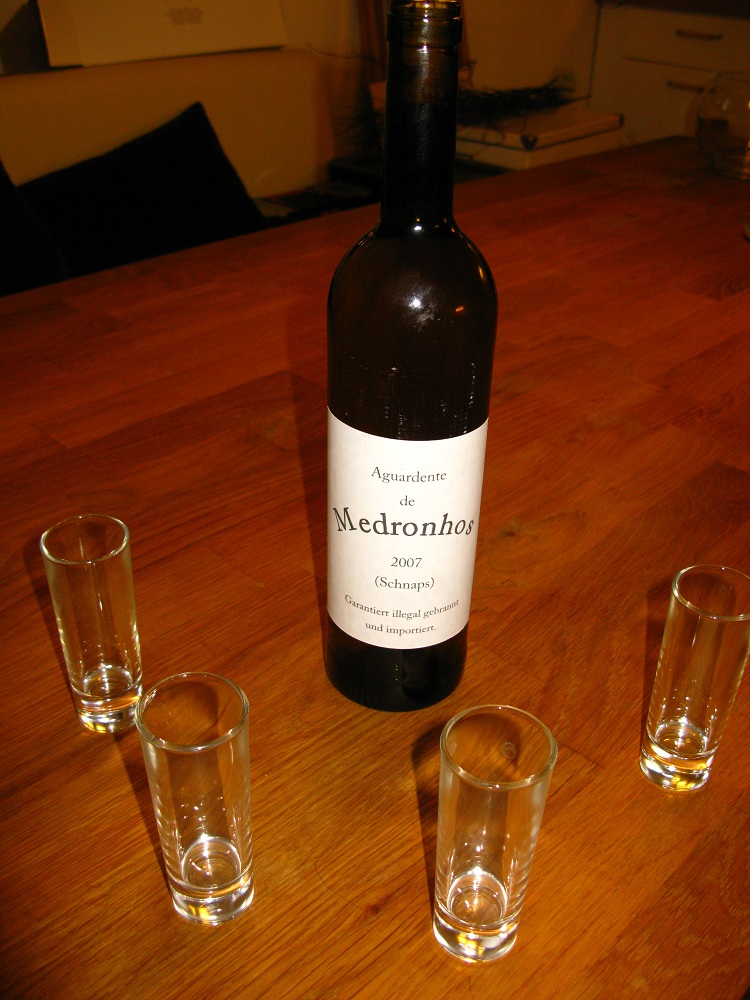Medronho on:
[Wikipedia]
[Google]
[Amazon]
 The
The
A blog about the tree and the liquor (Portuguese)
 The
The Aguardente
(Portuguese language, Portuguese) or (Spanish language, Spanish) (; ; ) is a type of distilled alcoholic spirit that contains between 29% and 60% alcohol by volume (ABV). It is a somewhat generic term that can refer to liquors made from vario ...
de Medronho is a strong spirit, a traditional fruit brandy
Fruit brandy (or fruit spirit) is a distilled beverage produced from mash, juice, wine or residues of edible fruits. The term covers a broad class of spirits produced across the world, and typically excludes beverages made from grapes, which are ...
from Portugal
Portugal, officially the Portuguese Republic, is a country on the Iberian Peninsula in Southwestern Europe. Featuring Cabo da Roca, the westernmost point in continental Europe, Portugal borders Spain to its north and east, with which it share ...
, obtained from arbutus berries - the fruit of the Medronho tree, ''Arbutus unedo
''Arbutus unedo'', commonly known as strawberry tree, also called madrone, is an evergreen shrub or small tree in the family Ericaceae, native to the Mediterranean Basin and Western Europe. The tree is well known for its fruits, the arbutus berr ...
'' - also called strawberry tree. The ''Arbutus unedo
''Arbutus unedo'', commonly known as strawberry tree, also called madrone, is an evergreen shrub or small tree in the family Ericaceae, native to the Mediterranean Basin and Western Europe. The tree is well known for its fruits, the arbutus berr ...
'' grow wild on the poor soils in rural regions of Portugal such as Lousã
Lousã (), officially Lousã Town (), is a town and municipality in the district of Coimbra, in the central part of Portugal. The population in 2011 was 17,604, in an area of 138.40 km2.
History
The oldest evidence provides an indication of ...
and the inner Algarve
The Algarve (, , ) is the southernmost NUTS statistical regions of Portugal, NUTS II region of continental Portugal. It has an area of with 467,495 permanent inhabitants and incorporates 16 municipalities (concelho, ''concelhos'' or ''município ...
(in such places like Marmelete and São Marcos da Serra).
There was no large-scale commercial plantation of ''Arbutus unedo'' until the 21st century and in the past the arbutus berries were mainly collected by local farmers, by hand and processed privately. Therefore, good Aguardente de Medronhos was not easily found in supermarkets but instead bought mostly directly from these farmers. Very few farmers had a license for distillation, but they were tolerated by the authorities to keep this traditional Portuguese specialty alive.
A commercial derivative, sweetened with honey and flavoured with herbs, is sold under the brand names ''Brandymel'' and Dom Cristina.Dom Cristina: O Licor que Perdeu o Nome (PlanetAlgarve) https://planetalgarve.com/2014/10/16/dom-cristina-o-licor-que-perdeu-o-nome/
Aguardente de Medronho is also known as 'firewater' to non-Portuguese speakers. It is a rough translation from ''água ardente'', which is Portuguese for ''burning water''. The spirit obtains this name from the hot sensation as the consumed beverage travels down the throat and is felt through the sinuses.
The alcohol content of the beverage can vary; however, many bottles of Aguardente de Medronho contain around 48% alcohol by volume. The beverage is consumed in shot-glass sized portions.
External links
A blog about the tree and the liquor (Portuguese)
References
Portuguese distilled drinks Brandies Arbutus {{Distilled-drink-stub